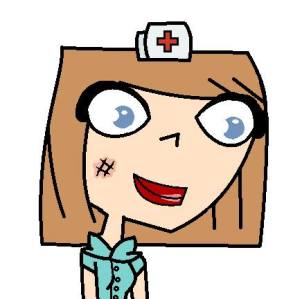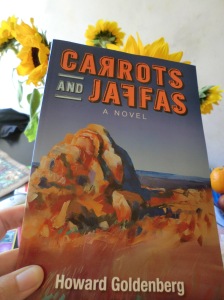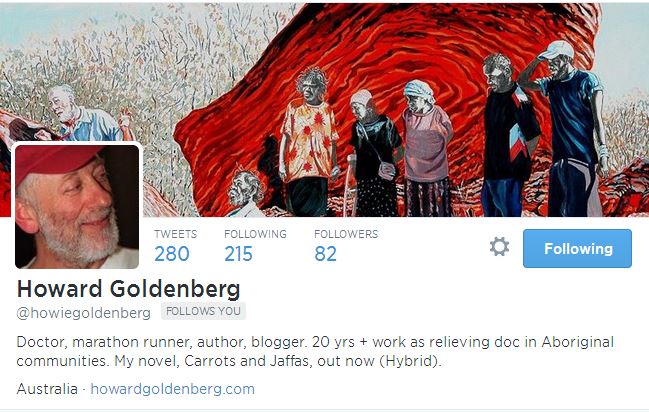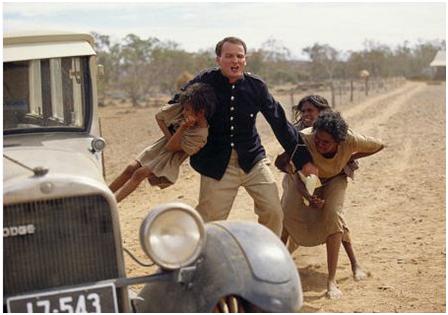 All quiet on the blogging and reading front recently as life’s dramas intervened and demanded my full attention. Our daughter had a diabetic crisis 2 weeks ago and has been in hospital, she is stable now and happy to be home and said I can use this new picture she created for her Facebook page.
All quiet on the blogging and reading front recently as life’s dramas intervened and demanded my full attention. Our daughter had a diabetic crisis 2 weeks ago and has been in hospital, she is stable now and happy to be home and said I can use this new picture she created for her Facebook page.
Consequently I have been carrying Carrots and Jaffas around with me and rereading passages, though I finished it more than 2 weeks ago and finally today had time while our son was at hip hop to move my scribbles here. Apologies Howard for taking so long to share your wonderful book.
Carrots and Jaffas is a wonderful example of how the virtual world allows us to come across writing voices that we don’t always find in bookshops or through mainstream publishers, that don’t require one to have publishing connections or be in the know. Just to be open to the random, serendipitous crossing of paths.
We find them when we are curious, someone may write 140 characters on twitter that prompt us to follow them, read their blog, consider their book and Voila, an instinct results in the arrival of a unique and intriguing book and an unforgettable reading experience.
Howard Goldenberg followed me on twitter, and this is what I saw when I considered whether to follow back.
Intrigued, I clicked on his blog link and perhaps uncharacteristically, as his posts are quite varied, the first thing I read was a book review for a book called Joyful by Robert Hillman. The author name seemed familiar, so I read on and was captivated by the review, not just Howard’s account of the story, but the homage to the book and its author his review paid. I thought not only does this sound like a wonderful book, but I want to read more of Howard Goldenberg’s writing and continued to read post after enthralling post.
When his novel Carrots and Jaffas arrived I opened the first page and read praise of the book by the author I mention above, Robert Hillman and a few pages further on, I realised why the name had sounded familiar. There on a page of epigrams preceding the first chapter I read the following quote from one of my Top Reads of 2013 The Honey Thief I reviewed here:
“My heart and my mind, my bones and my flesh and all the organs of my body are bound together with the cords of the stories I was told.” From The Honey Thief by Najaf Mazari and Robert Hillman
 Carrots and Jaffas is a story of twin boys, one of whom will be stolen, the people who surround them and whom they encounter, and how the events that occur change their lives and character.
Carrots and Jaffas is a story of twin boys, one of whom will be stolen, the people who surround them and whom they encounter, and how the events that occur change their lives and character.
The boys are the identical sons of Luisa and Bernard, a couple who worked and met in the same hotel. We are witness to their initial encounters and courtship in the opening chapters of the book, Luisa with her unique use of the English language, peppered with old-fashioned biblical words and quotes, charming in her deliverance. Bernard is enraptured by this exotic woman who interprets his comments in ways he could not have imagined, and is curious to understand more.
A month or so into these pleasant outings, an envelope appears on Bernard’s desk. Square in shape, lilac in colour, unbusinesslike, it sits on his keyboard like a question mark. Curious, he picks it up. A hint of gardenia in his nostrils. Bernard, more than curious, hefts the envelope, feels its substance. Fast fingers break the seal and Bernard reads:
La Señorita Luisa Morales
Has pleasure in inviting
El Señor Bernard Wanklyn
To Mate.
The delight and humour encountered in their courtship sits in stark contrast to the first pages in which we are witness to a kidnapping and the deranged thinking of the captor as we understand he justifies his act with thoughts of retribution for an elderly Aborigine lady Greta, who had two sons stolen from her by the authorities many years before, something that pains her still today.
Louisa and Bernard’s family unit is a metaphor for lives changed by tragic disappearance, the intersection of mixed cultures, social classes, politics and dysfunctional families. Luisa is an Argentinian immigrant whose parents were part of the “disappeared” during the time of the generals. After her grandmother took her to the park one day when she was three years, ago, they returned to discover both her parents gone, disappeared. Her grandmother continues to sit with Las Madres of the disappeared, mothers waiting, never giving up hope that their sons and daughters might return.
Separation changes relationship dynamics and Goldenberg deftly handles the effect of passive versus active separation on the identical twins with surprising, thought-provoking results. The experience is unusual and exposes the reader to the positive growth of someone in an otherwise traumatic situation. Observing the separate experiences of the twins exposes the suffering of those left behind, helpless in their efforts to find their son, the brother and yet when we are with Jaffas we are not afraid for him.
There are so many layers and learnings, such acute observations and joy in language and celebration of storytelling in this novel, it is difficult to describe without spoiling the experience for the reader, the spontaneous humour, the obvious cultural aspects, all round it was a pleasure to read and engaging all the way through. There were perhaps a few too many coincidences that made me pause for consideration, but then we know stranger things happen in real life and certain experiences can tend to gravitate towards people, repeating in history, so I let it pass.
Thoroughly recommend seeking this out and checking out Howard’s blog here. He writes fun poetry too.
Thank you @HelenHelenback for sending me a copy of the book.



I LOVE your daughter’s illustration. She is mega talented and her artwork is really sophisticated — far beyond her age. I hope she considers art in any form when she’s ready to think of a career. Glad she’s feeling better and is back home 🙂
LikeLike
Sad to hear of your daughter’s illness/crise, but relieved to hear she’s better. Your voice was missed, but clearly you were needed elsewhere. Best wishes to you and family.
LikeLike
Lovely review of an enjoyable book, which I read and reviewed recently. I loved the layering too – which made it rather hard to review. So many perspectives. You’ve done a great job of getting many of them across. (Glad to hear your daughter is doing fine – must have been very worrying.)
LikeLike
Glad to hear your daughter’s better – and what a delightful portrayal of her hospital experience! This looks like a fun novel, I’ll be sure to check out Howard’s blog too.
LikeLike
Reblogged this on howardgoldenberg and commented:
COINCIDENCE
“My grandfather happened to be in Britain at the start of the First World War. He and his brothers farmed the family property in the Victorian high country. Somehow though, he was visiting England, a war was on, we were part of the Empire, so he joined up.
Meanwhile back in Australia, his brother volunteered. They wrote to each other with their news: it turned out both had been posted to the Middle East, but to different units in different locations.
“Grandfather and great-uncle tried to keep in touch, and when Grandfather was given leave on Christmas Day he wrote to Uncle Bob promising to meet him outside the General Post Office in King George Street in Jerusalem on that day. He’d meet Grandfather there at noon. It didn’t surprise him that he didn’t receive a reply – there was a war on. His brother’s silence didn’t make him change his plans.
“At noon on December 25 – I think it was 1916 – Grandfather took up his station outside the Post Office and waited for Bob. By 1.00pm Bob hadn’t appeared, but Grandfather wasn’t worried or surprised. There was a war on, they both had to cadge lifts from army transport vehicles. He waited. Grandpa was excited and nervous; he and Bob hadn’t seen each other since before the war.
Grandfather said he needed to go to the toilet but didn’t dare in case Bob came and found he wasn’t there and they’d miss each other. He told me he danced around for hours with his bladder filling and his hopes fading.
“By four o’clock it was getting cool, the day was coming to its end and Grandfather feared he’d wet himself. Bob never showed. Another soldier passing by told Grandfather there were public toilets around the corner and one block down.
Grandfather strode down the street, turned left and collided with another man in uniform. “Sorry mate”, he said, untangling himself. Through the gloom came the same words in the same voice. The two men peered at each other. It was Uncle Bob.
‘The funny thing was’ – Grandfather told me – ‘Bob never received my letter!’”
That story was told to me by a workmate in 1974. It has stayed with me these forty years. I know that post office, I know the cold and dark of evening in Jerusalem at Christmas.
Today I received a flattering (and I must say insightful) review of my novel “Carrots and Jaffas” from a lady I’ve never met who lives, reads, reviews and blogs in France. (Coincidentally, we found each other by chance.) Claire Mc Alpine is my reviewer’s name. Somehow Claire managed to compose her review through a period of family medical crisis. How the empty page draws the pen!
Towards the end of her piece Claire Mc Alpine remarks on the long arm of coincidence that reaches out towards the end of my novel. She is right. As I wrote the section in question I had in my mind the accidental finding of kin, of brothers, between my friend’s grandfather and her great uncle Bob. This closing stage of the book gives voice to a daydream that I fall into from time to time in my work as a locum doctor in outback Aboriginal communities. Medical work in those places is full of nightmare: so much loss, so much suffering , almost all of it preventable. In my reverie I dream of a utopian resolution of the actual. My writing always hopes for redemption. In the closing pages of “Carrots and Jaffas” I gave voice to that wishful state; I allowed the intelligence and the questing longing of my character ‘the Doc’ to be rewarded by coincidence.
And I know from first hand stories of Holocaust survivors who have been separated from kin, for decades beyond hoping, that fate is not always cruel, that brothers are sometimes found.
LikeLike
Another first-class reviewer – delighted to find you !
LikeLike
I don’t know what happened, Claire, but my comment seems to have started writing itself — which could be appropriate in light of your observation re: the ways in which Cyberspace can take us to unexpected places. Discovering wonderful writers who may be a bit under the radar is a special joy. That you managed to write about an enticing new book with all that I imagine is preoccupying you is my idea of grace under pressure. I am totally charmed by your daughter’s artwork — what spirit she has! Most important, glad she’s doing better.
LikeLike
Pingback: Literary Blog Hop Book #Giveaway | Word by Word
Hope your daughter is feeling better now, Claire. Sending positive thoughts and wishes to her.
Wonderful review! Thanks for introducing us to a wonderful new writer! Enjoyed reading Howard Goldenberg’s comment too. It was interesting to read your thoughts on how the name of Robert HIllman rang a bell and how you did detective work to find out how you knew his name.
LikeLike
Thanks Vishy, Allia is doing well and has finished school so I’ll be calling on her digital art skills to assist me 🙂
I just realised that all the content on Howard’s blog post before he linked to this review attached itself here 🙂 a wonderful story he shares, he has many wonderful vignettes on his blog from more than one lifetime of experiences as this story attests. I am offering a copy of his book in a literary blog hop giveaway, so make sure you leave a comment to enter. Are you on twitter?
Yes, I was overjoyed to find a connection to The Honey Thief, and I must go back and look at Robert Hillman’s book, he too sounds like a writer I would like to read more of. Writer’s with a touch of altruism bring something special to the page.
LikeLike
Glad to know that Allia is doing well now, Claire. Hope both of you enjoy working together on digital art 🙂
Howard’s book sounds so wonderful. I loved your description of it – that it has more than one lifetime of experiences described in it. Yes, I am on Twitter (@vishytheknight),. but I haven’t used it in a long time (it was so addictive :)) I should get back to it one of these days.
Hope you enjoy exploring Robert Hillman’s books. Happy reading!
LikeLike
So glad to know your daughter is doing well now, Claire.
My 10 year old had diabetes when he was only 3 years and we just had a routine check up to prepare for him for nursery or kindergarten school. The doc gave us options of orthodox medications or herbal. We chose to go herbal and we gave him the boiled liquid of what we call bitter leaf. He took this for one year. And the diabetes has cleared completely. We go for regular check up and his level is very normal.
That’s a excellent review of a remarkable book, I must say..
LikeLike
Did he have Type 1 or Type 2 diabetes? As far as I know there is no known cure for Type 1, an auto immune disease, which is what my daughter has, whereas Type 2 the metabolic disease, is more treatable and be cured.
I’m glad you enjoyed the review, thanks for your comments.
LikeLike
He had Type 2.
LikeLike
Oh right, that explains it. How great that he is cured and you all had the opportunity to learn how to manage it.
LikeLike